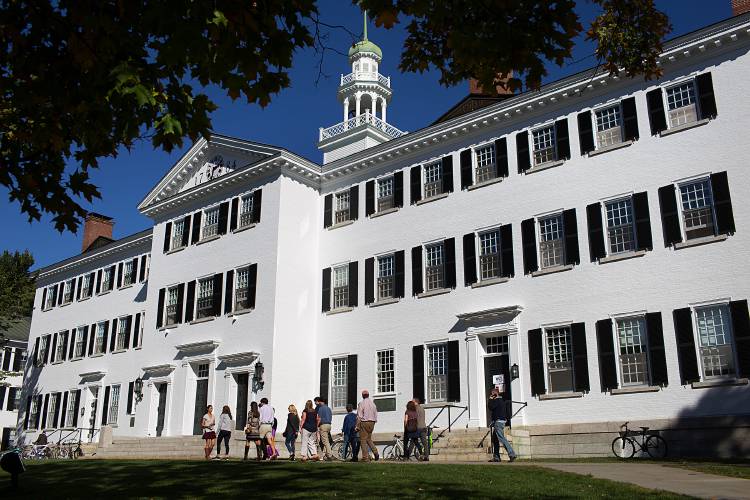Editorial: Dartmouth’s reinstatement of standardized tests shows promise

Prospective Dartmouth College students are given a campus tour in Hanover, N.H., on October 7, 2016. (Valley News - Geoff Hansen) Copyright Valley News. May not be reprinted or used online without permission. Send requests to permission@vnews.com. Geoff Hansen
|
Published: 02-09-2024 9:01 PM
Modified: 02-16-2024 2:48 PM |
Of all the reasons for colleges to require applicants to take a standardized test, among the most unlikely would seem to be promoting increased diversity in the student body. But that is precisely the rationale cited by Dartmouth this week in reinstating the requirement to submit SAT or ACT scores beginning with the Class of 2029.
Critics of standardized tests have long argued that the scores only mirror the many advantages already enjoyed by applicants from affluent backgrounds, such as access to excellent secondary schools; expensive test preparation classes; highly skilled guidance counselors; and a full range of enrichment activities, including exclusive sports travel teams and specialty summer camps.
It stands to reason that that sort of head start would result in higher test scores than those posted by students from low-income backgrounds, and therefore confer another leg up in the admissions race to highly selective colleges such as Dartmouth, which this year received 31,000 applications for 1,200 spots in the freshman class.
Dartmouth begs to differ, citing research by four of its professors who evaluated the merits of requiring applicants to submit the test scores. First, some background. Dartmouth and dozens of other selective schools suspended the standardized test requirement during the COVID-19 pandemic, when it was difficult for high school students to take the tests. Instead, the college made the submission of SAT or ACT scores optional.
The professors’ research concluded that standardized test scores are a more reliable predictor of academic success at Dartmouth than high school grades, college entrance essays and teacher recommendations. Other higher-education research has reached the same conclusion. This is no surprise. Grade inflation has resulted in the proliferation of As in secondary schools, so their significance in the college admissions process is understandably diminished. And with the advent of sophisticated artificial intelligence technology, the admissions essay may be rendered virtually useless as a tool to evaluate applicants
When the researchers drilled down further into the data, they were able to analyze the test scores even of applicants who had not submitted them, according to The New York Times. (Colleges can access those scores once the admissions process is over). What they found was a surprise to us: that students from lower-income backgrounds who scored in the 1,400 range on the SAT’s (1,600 is the top of the scale) would have bolstered their case for admission had they chosen to submit the scores.
Presumably they did not because they thought the scores were too low and would harm their chances. But Dartmouth says it recognizes that kids from impoverished backgrounds are not competing on a level playing field with their affluent peers. A score in the 1,400 range by, for example, lower-income applicants attending struggling secondary schools could help to identify students who have surmounted obstacles and have what it takes to excel at Dartmouth. Thus, a chance to increase diversity in the student body while maintaining academic standards.
We suspect that the college will encounter two objections: on one side, that admitting some students with lower test scores rather than other highly qualified applicants runs afoul of the Supreme Court’s ruling on race-based admissions; on the other, that reimposing the testing requirement reinforces an already yawning equity gap at an elite university.
Article continues after...
Yesterday's Most Read Articles
 Herd departs Hartford’s last remaining dairy farm
Herd departs Hartford’s last remaining dairy farm
 Kenyon: What makes Dartmouth different?
Kenyon: What makes Dartmouth different?
 At Dartmouth, hundreds protest ongoing war in Gaza and express support for academic freedom
At Dartmouth, hundreds protest ongoing war in Gaza and express support for academic freedom
 Editorial: Parker parole a reminder of how violence reshapes our lives
Editorial: Parker parole a reminder of how violence reshapes our lives
 A Life: Richard Fabrizio ‘was not getting rich but was doing something that made him happy’
A Life: Richard Fabrizio ‘was not getting rich but was doing something that made him happy’
Standardized tests are by no means an entirely objective measure, but as long as they are but one tool among several used by colleges to evaluate applicants, it seems to us they do have value in an admissions process that is often otherwise opaque and highly subjective.
As to diversity, the dean of admissions at the Massachusetts Institute of Technology told the Times that after the school brought back the test requirement, it admitted “the most diverse class that we ever had in our history.” That class is 15% Black, 16% Hispanic, 38% White and 40% Asian American. And about 20% receive federal Pell Grants for lower-income students.
We are not sure what level and kind of diversity — economic, racial, gender, cultural — Dartmouth is aiming for, but the issue is not merely academic. Graduates of selective schools have an outsized impact on society, and in the interests of both equity and excellence, it matters greatly who has access to that education.

 Editorial: Chris Sununu’s moral vacuum
Editorial: Chris Sununu’s moral vacuum Editorial: Gambling tarnishes America’s sporting life
Editorial: Gambling tarnishes America’s sporting life By the Way: A white nationalist’s many mistruths
By the Way: A white nationalist’s many mistruths
